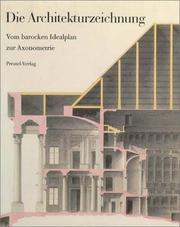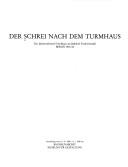| Listing 1 - 7 of 7 |
Sort by
|

ISBN: 3791307215 Year: 1987 Publisher: München Prestel
Abstract | Keywords | Export | Availability | Bookmark
 Loading...
Loading...Choose an application
- Reference Manager
- EndNote
- RefWorks (Direct export to RefWorks)
architectuur --- buildings [structures] --- perspective [technique] --- perspectief --- gebouwen --- architecture [discipline] --- -Drawing, Architectural --- Plans --- Communication in architectural design --- Mechanical drawing --- Technische Universitat Munchen. Architektursammlung --- architectural drawings [visual works] --- Technical drawing --- Architecture --- Architectural drawing --- Exhibitions --- Drawing, Architectural --- Architectural design --- Drawing --- Technische Universität München. --- Munich. --- Architektursammlung der Technischen Universität München --- Exhibitions.

ISBN: 3870241276 Year: 1988 Publisher: Berlin Argon
Abstract | Keywords | Export | Availability | Bookmark
 Loading...
Loading...Choose an application
- Reference Manager
- EndNote
- RefWorks (Direct export to RefWorks)
Architecture --- Skyscrapers --- Tall buildings --- History --- Berlin (Germany) --- Buildings, structures, etc.
Digital
Abstract | Keywords | Export | Availability | Bookmark
 Loading...
Loading...Choose an application
- Reference Manager
- EndNote
- RefWorks (Direct export to RefWorks)
Digital
Abstract | Keywords | Export | Availability | Bookmark
 Loading...
Loading...Choose an application
- Reference Manager
- EndNote
- RefWorks (Direct export to RefWorks)
Book
Year: 2011 Publisher: London Centre For Economic Policy Research
Abstract | Keywords | Export | Availability | Bookmark
 Loading...
Loading...Choose an application
- Reference Manager
- EndNote
- RefWorks (Direct export to RefWorks)
Book
Year: 2020 Publisher: Cambridge, Mass. National Bureau of Economic Research
Abstract | Keywords | Export | Availability | Bookmark
 Loading...
Loading...Choose an application
- Reference Manager
- EndNote
- RefWorks (Direct export to RefWorks)
Information is often embedded in memorable contexts, which may cue the asymmetric recall of similar past news through associative memory. We design a theory-driven experiment, in which participants observe signals about hypothetical companies. Here, identical signal realizations are communicated with identical contexts: stories and images. Because participants asymmetrically remember those past signals that get cued by the current context, beliefs systematically overreact. This overreaction depends in predictable ways on the signal history; the correlation between signals and contexts; and the scope for forgetting and associative memory. We quantify these results by structurally estimating a model of associative recall.
Book
Year: 2020 Publisher: Cambridge, Mass. National Bureau of Economic Research
Abstract | Keywords | Export | Availability | Bookmark
 Loading...
Loading...Choose an application
- Reference Manager
- EndNote
- RefWorks (Direct export to RefWorks)
Throughout the Western world, people's policy views are correlated across domains in a strikingly similar fashion. This paper proposes that what partly explains the structure of ideology is moral universalism: the extent to which people's altruism and trust remain constant as social distance increases. In new large-scale multinational surveys, heterogeneity in universalism descriptively explains why the left and right both simultaneously support and oppose different types of government spending. Moreover, the left-right divide on topics such as redistribution strongly depends on whether people evaluate more or less universalist policies. Large-scale donation data provide additional evidence for the political left's universalism.
| Listing 1 - 7 of 7 |
Sort by
|

 Search
Search Feedback
Feedback About UniCat
About UniCat  Help
Help News
News